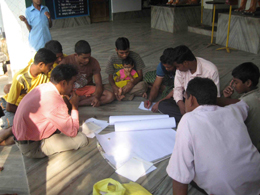Access to Energy:
Towards Energy Efficiency for Orissa
CEE Orissa has initiated a project titled “Access to Energy” to collect baseline data on electricity distribution, use and bill collection to understand the use of electricity in different categories in rural sectors of Orissa. This was part of a detailed plan of activities to improve energy efficiency in rural areas of the State being designed by Orissa Government.
 |
Preparing social map in Bandalo village |
|
|
Baseline data of energy usage pattern was collected from 20 villages in 4 clusters; which were selected based upon certain criteria (e.g. highest consumption of electricity, maximum no. of consumers, good bill collection status, etc.). The data was collected directly from the villagers and social institutions with the help of Energy Auditors through participatory methods. The survey considered energy use into 5 categories i.e. domestic use (illumination, cooling appliances, entertainment & other domestic appliances), community use (use of electricity in public places like temple, community hall, etc.), agriculture use (irrigation pumps), public drinking water pumps and Small and Medium Enterprises i.e. SMEs (rice huller, leaf cup and plate pressing machines, etc.).
The study revealed some interesting trends: i) Power consumption in the domestic sector is the maximum, (ii) Power consumption by cooling appliances like fans is more during warmer seasons, (iii) Use of Refrigerators is more in hotter seasons and also in villages having close proximity to towns and cities, (iv) Similarly, use of grinders is also more in villages having close proximity to towns and cities, and (v) Consumption in Agriculture and SME Sectors does not follow any particular pattern; rather it mostly depends on the irrigation potential and raw materials available in the locality. The survey revealed that replacing incandescent bulbs with CFL bulbs could save energy by about 70%.
In the second phase, a strategy to improve the energy efficiency is planned. It includes raising awareness at all social levels, making sustainable village energy plan through energy champions in Gram Panchayats, replacing incandescent bulbs at domestic and community level with CFLs and LEDs, devising a cost sharing mechanism with the local community to introduce smokeless chullahas, solar street lights.

